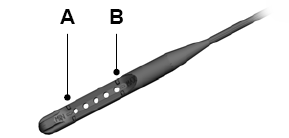Ford Escape: Cross Traffic Alert / Cross Traffic Alert Precautions. Cross Traffic Alert Limitations. Switching Cross Traffic Alert On and Off
Cross Traffic Alert Precautions
WARNING: Do not use the cross traffic alert system as a replacement for using the interior and exterior mirrors or looking over your shoulder before reversing out of a parking space. The cross traffic alert system is not a replacement for careful driving.
WARNING: The system may not operate properly during severe weather conditions, for example snow, ice, heavy rain and spray. Always drive with due care and attention. Failure to take care may result in a crash.
Cross Traffic Alert Limitations
Cross Traffic Alert may not correctly operate when any of the following occur:
- Something is blocking the sensors.
- Adjacently parked vehicles or objects are obstructing the sensors.
- Vehicles approach at speeds less than 4 mph (6 km/h) or greater than 37 mph (60 km/h).
- Your vehicle speed is greater than 7 mph (12 km/h).
- You reverse out of an angled parking space.
Switching Cross Traffic Alert On and Off
To switch cross traffic alert on or off use the touchscreen.
- Press Settings on the touchscreen.
- Press Driver Assistance.
- Switch Cross Traffic Alert on or off.
Note: The system switches on every time you switch the ignition on. To permanently switch the system off, contact an authorized dealer.
 How Does Cross Traffic Alert Work
How Does Cross Traffic Alert Work
Cross Traffic Alert detects vehicles that
approach at a speed between 4–37 mph
(6–60 km/h). Coverage decreases when
the sensors are partially, mostly or fully
obstructed...
 Locating the Cross Traffic Alert Sensors. Cross Traffic Alert Indicators
Locating the Cross Traffic Alert Sensors. Cross Traffic Alert Indicators
Locating the Cross Traffic Alert Sensors
The sensors are behind the rear bumper
on both sides of your vehicle.
Note: Keep the sensors free from snow, ice
and large accumulations of dirt...
Other information:
Ford Escape 2020-2025 Owners Manual: Auto Hold
How Does Auto Hold Work Auto Hold applies the brakes to hold your vehicle after you stop it and release the brake pedal. This can help when waiting on a hill or in traffic. Switching Auto Hold On and Off WARNING: The system does not replace the parking brake...
Ford Escape 2020-2025 Service Manual: Removal and Installation - Hydraulic Control Unit (HCU) - Vehicles With: Vacuum Brake Booster
Removal NOTE: Removal steps in this procedure may contain installation details. NOTE: A new HCU is equipped with an ABS module. A new ABS module does not come equipped with an HCU . NOTE: The PMI process must begin with the current ABS module installed...
Categories
- Manuals Home
- 4th Generation Ford Escape Owners Manual
- 4th Generation Ford Escape Service Manual
- Accessing the Trip Computer. Resetting the Trip Computer
- General Procedures - Brake Service Mode Activation and Deactivation
- General Procedures - Transmission Fluid Level Check
- New on site
- Most important about car
Engine Oil
Engine Oil Dipstick Overview

